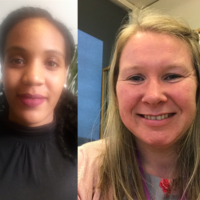Making health research more inclusive for Deaf British Sign Language (BSL) community
The NIHR Manchester Biomedical Research Centre (BRC) and Clinical Research Facility (CRF) patient, public involvement and engagement (PPIE) aims to improve diversity and inclusion of those involved in health research such as members of the public, patients and their carer’s.
Here Celia Hulme Manchester BRC Doctoral student, a Deaf BSL user and Olivia Joseph, Manchester BRC PPIE Project Manager tell us how and why they developed research’s first Deaf Experts by Experience group (DEEG) in the UK.
Background
It is estimated that there are 11 million people in the UK who are deaf or hard of hearing. Within this group of deaf people are sign language users. British Sign Language (BSL) is the preferred language for over 87,000 Deaf people in the UK (BDA, 2015) and it was recognised as a language indigenous to the UK in 2003.
Making health research more inclusive for Deaf British Sign Language (BSL) community
There are many ways that people can be involved in health research, for example, meeting researchers, taking part in surveys or attending community events. However, Olivia had recently identified that many of these activities were not accessible, nor suitable for Deaf BSL users.
Olivia
Hearing Health researchers required a patient involvement plan to establish a database of people, which reflect the diversity of D/deaf* populations, for researchers to ask their opinions, views and thoughts about health research. Assessing the needs for D/deaf communities was essential, in order to listen, shape and challenge the plan. At the time, I struggled to recruit Deaf BSL users to the scoping workshops and their thoughts were absent from the first draft of the patient involvement and engagement plan.
The initial plan was to group D/deaf communities together as panel A and parents of D/deaf children and young people together as panel B (Figure 1).

Figure 1
Professor Alys Young (Manchester BRC PhD Supervisor) recommended discussing the draft patient involvement and engagement plan with Celia. Celia immediately questioned my approach and highlighted the barriers for BSL users especially recruitment content, format and methods.
It was a great opportunity to learn from someone with both lived experience of being a Deaf BSL user and familiar with the barriers to being involved in health research. We discussed solutions and co-developed a new plan for involvement and engagement with a tailored approach to start to provide a platform for underserved audiences (Figure 2).

Figure 2
Establishing a Deaf Experts by Experience group (DEEG)
Celia
BSL users were originally grouped in with people who were not born deaf and hard of hearing people. I helped Olivia to understand that this isn’t suitable as BSL users are a cultural-lingual minority, whose lived experiences are very different from other deaf people when navigating the healthcare landscape.
Many Deaf BSL users leave school with few qualifications and have low literacy skills which impacts on their access to training courses and feedback events. It was important to provide Deaf BSL users with an environment that is conducive to their language and learning.
As a result we identified that we needed to set up a panel group (DEEG) specifically for Deaf BSL users to enable them to be involved in shaping health research.
Before launching the DEEG panel, we identified that it would be ideal to provide Deaf BSL users training to help skill people up to be an effective member of the DEEG panel. A six-week Deaf-led training course was provided covering topics such as group work, diversity, what is research, ethics, PPIE panel duties and experiencing a mock research presentation. This was incredibly well-received and many Deaf people across the UK were asking to be involved or have a training course delivered in their areas. It is important to note that this DEEG panel only covers Greater Manchester.
Our advice to others
Celia and Olivia
We’ve learnt a lot during this process and want to share this with the research community in the hope that they will use our experience as a template to create their own DEEG panels or events:
- Jointly lead with a Deaf organisation or Deaf individuals to ensure appropriate set up of panel, training or event.
- Make sure information is accessible (Plain English, BSL, visual representation where possible).
- Written information can be translated into BSL and filmed to improve communication with Deaf BSL users.
- Deaf BSL users are more likely to engage when written information is translated into BSL and videos are created to share online.**
- Don’t give panel members too much information in one session.
- Ensure the BSL/English interpreters you book are fully qualified & NRCDP registered.
What are the next steps?
We will be:
- Promoting the panel to researchers across all of the BRC themes.
- Promoting good practice of including BSL users in health research.
- Developing the training course so it can be rolled out to other locations across the UK and beyond.
- Continuing to learn from and evaluate this work.
I am thoroughly proud of Manchester BRC valuing inclusivity specifically with Deaf BSL users. They have been innovative, forward thinking, encouraging and enabling by ensuring Deaf BSL users are involved in all stages and I look forward to continuous work with Manchester BRC.
Celia Hulme
Contact
If you are a Deaf BSL user and want to find out more about the Greater Manchester DEEG panel or you are a researcher who wants to access the DEEG panel, please contact: Public Programmes: publicprogrammes@mft.nhs.uk
* In this blog, ‘deaf’ with a lower case ‘d’ refers to deaf people who are spoken language users. Deaf people who use British Sign Language (BSL) are conventionally referred to as upper case ‘D’ (‘Deaf’).
**Generally, an interpreter works between spoken language and BSL and a translator works between written language and BSL.
